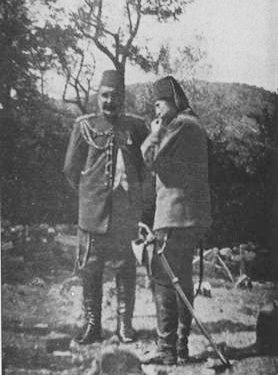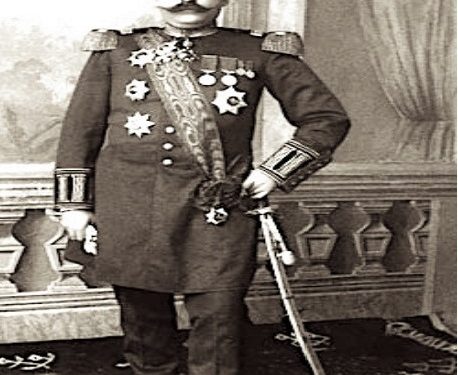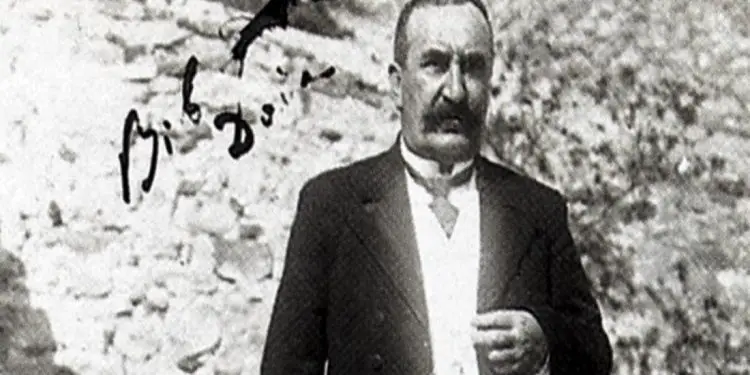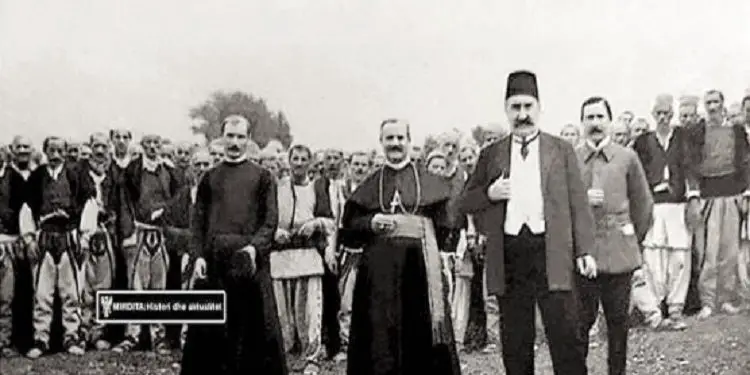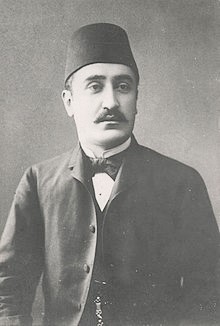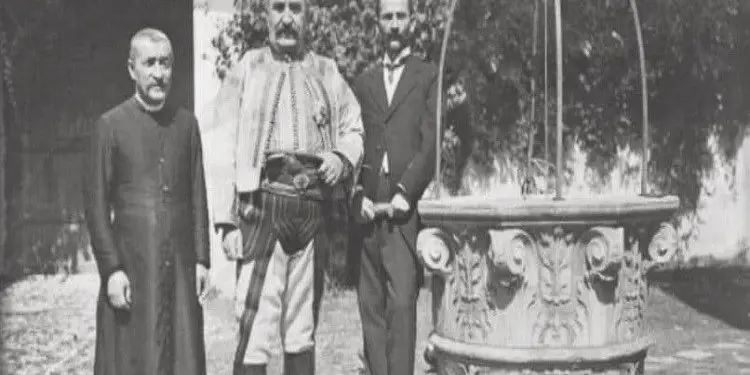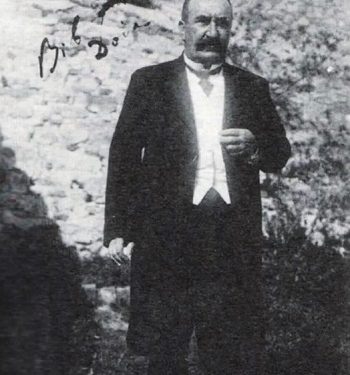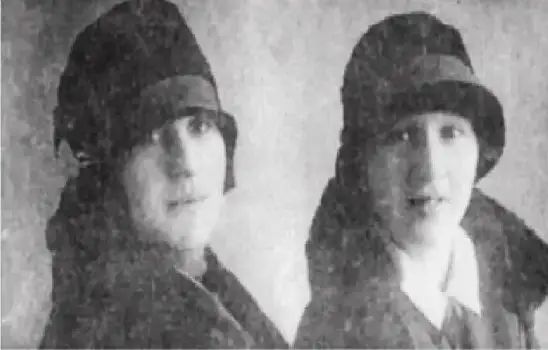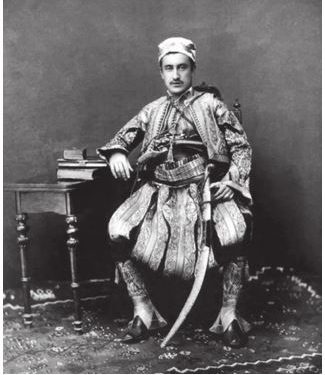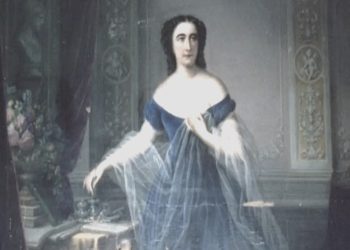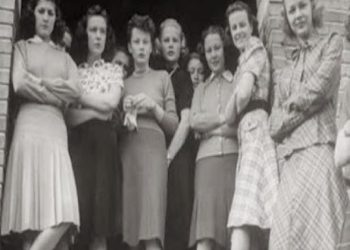By Dr. Nikol Loka
Part fifteen
“PRENGA BIBE DODA, THE SHADOWS OF A CITIZENSHIP”
Memorie.al / The newest book “Prengë Bibë Doda, a phenomenon in Albanian political life”, by researcher Nikollë Loka, not only expands the scope of historical studies on Mirdita, the Door of Gjonmarkaj and the figure of the Mirdita Prince, Prengë Bibë Doda, but it is also a contribution to national historiography. The very rich archival material, the literature used or consulted, oral traditions, etc., make this book a real study treasure, giving the science of history a scientific monograph that enriches our knowledge of Mirdita, its captains, tradition, history etc. To study such an important and complex figure, as the figure of Prengë Biba Doda, is a high scientific responsibility that not everyone undertakes. Nikollë Loka, has done a great job of research and treatment by the professional researcher, giving us the portrait of the Prince and the general Mirditor, with the true contours. Dr. Loka has adhered to the end of the space and time, in which the multidimensional events and their protagonists have developed.
THE MONOGRAPH “ABOUT BIBË DODA, A PHENOMENON IN ALBANIAN POLITICAL LIFE”, A VALUABLE SCIENTIFIC STUDY THAT ENRICHS THE FUND OF OUR HISTORICAL STUDIES
(By Mr. Sc. Murat Ajvazi, March 2017, Switzerland)
Continues from last issue
The Sultan’s pardon
Despite these events, the relationship between Krajl Nikola and Prince Prengë Bibë Doda would not be interrupted. At the beginning of December 1912, Prenga met Nikola, who accepted the creation of the Principality of Mirdita, on the condition that it did not go beyond Lezha and Kallmet, (285) territories that the small Montenegrin Kingdom wanted to claim. Actually, Prenga did not intend to rely on Montenegro, which according to him was a small and poor country, but this move of his had more of a propaganda character, within the political game he was playing. Three years later, the agreement turns into a dispute again, after the Montenegrins arrest Prengë Biba Doda. On June 8, 1915, when the Montenegrin army entered Shkodër, arrested and exiled to Montenegro, the Albanian patriots: Prengë Bibë Doda, Aqif Pashë Elbasani, Luigj Gurakuqi, Fejzi Bej Alizoti, etc. After the Austro-Hungarian occupation of Montenegro, on January 25, 1916, they were released. (286)
As can be seen, this shared history between Nicholas of Montenegro and Prenga of Mirdita has been full of broken promises and mutual tricks. From all of this, we understand that those relations were based on temporary interests and a real cooperation was never created, due to the fact that the enmities were deep and prevailed over the efforts for cooperation. The strengthening of the national consciousness of the Mirditas, who increasingly saw their future in the framework of the Albanian nation, also influenced these hostilities.
In defense of Hoti and Gruda
The branch of the League of Shkodra issued a pledge for the protection of Albanian lands and requested the participation of Mirdita’s forces in the war. But the Mirditas strongly conditioned that participation on the return of autonomy. The Ottoman authorities, who had been tacitly supporting the League, moved towards meeting those demands. As a sign of goodwill, there was also the attitude towards the leader of Oroshi, who was arrested in 1879.
Despite the fact that his name is not given, it seems to be about Nikollë Ndreca, who is mentioned as a Bajraktar in the historical documents of that period. It is known that his arrest was made after he had not obeyed the orders of Kapidan Kola. Twenty-two zaptijas had accompanied Nikolla to Shkodra prison. (287)
In the first letter, Said Pasha wrote to Vali Izet Pasha in Shkodër, on December 20, 1879: “The issue of the kaymekamlluk of Mirdita is before the Council of Ministers. The decision will be communicated to you without delay. Until then, you are invited to release without delay, the arrested Bajraktar of Oroshi”. (288)
Since his order was not implemented, the Prime Minister is forced to request the implementation of his order. On January 4 of the following year, through a telegram, Said Pasha once again reminds Vali of his concern: “I telegraphed you on December 20 that the issue of Mirdita’s succession is before the Council of Ministers, etc. I’m learning that the leader of Oroshi has not been released, so I invite you for the second time, to execute the order and release him”. (289)
In the joint meeting they held in Shkodër, on March 1, 1880, the leaders of Hoti, Gruda, Kelmendi and Kastrati approved a petition addressed to the Great Powers, in which they declared that “they would take up arms to defend their lands”. Regardless of the request, on April 18, 1880, the ambassadors of the Great Powers approved the Italian proposal, known as “Vija e Korti”, to give Montenegro, instead of Plava and Gucia, the islands of Hoti of Gruda. The delivery of these visas was decided to take place after 4 days, on April 22. In March of that year, in a meeting of the Muslims of Shkodra, it was decided that, in order to attract the Catholics to the war, Prengë Bibë Doda was appointed as their commander. This proposal was accepted and for this purpose talks with Prenga began. (290)
On April 5, 1880, the Consul of France in Shkodër wrote to his Foreign Minister: “As far as the Catholics are concerned, everything makes you think that they will be for the election of Prengë Biba Doda. The governor, although he holds frequent meetings with the main leaders of the Movement, acts as if he has no knowledge of what is happening and always says that he will leave Shkodra, to go to Durrës, then to Mirdita. On Easter Monday, the governor went to visit Prengë Bibë Doda, with whom he had very cold relations and to whom he had not visited”. (291)
But Valiu Izet Pasha doesn’t just play behind the scenes; he invited all the leaders of Mirdita, who were paid by the government, to ask them if he can rely on them, in case of need. Regarding this effort of Vali, the French Consul reports to his Minister in Paris: “An employee of the guest house, who is a tribe of Prengë Bibë Doda, told me two days ago that he hoped that Dodë Gega, Kapidan Kola, etc. ., who are enemies of Prenga, when the general interest is at stake, they will put aside hostilities and see Prenga as their first. (292)
Prenga did not seem worried by his opponents, as he still, as recent events have shown, still had more support than his rivals and did not think that the opponents were in a position to take any action against the influence his. (293)
Representatives of the Catholics of Shkodra had gone to him to ask him to be put in charge of them. Prenga did not give them an immediate answer, but it was expected that his decision would be in favor of the League”. (294)
The talks continued for several others, between the heads of the Catholic Highlands and Prengë Biba Doda. Likewise, talks were held with his rivals, so that they would agree to be placed under Prenga’s orders. “Regarding Bibë Doda, he seems quite ready to accept the demands made to him and is expected to leave Shkodra and go to Malësi, where according to the announcements we have received, he will be announced as its president. If the Head of Mirdita will accept their request, there is a possibility that the other highlanders will follow the example of Hoti, Gruda and Kelmendi and recognize Prenga as their leader”, (295) – announced the Consul. French, his Foreign Ministry, in Paris.
Meanwhile, the Turkish Ambassador from Cetina informs Istanbul that the Montenegrin authorities were following the situation with concern and had accused the Ottoman government of Vilajetitm of attracting the Mirditas to the war against Montenegro. “Finally, Prengë Bibë Doda, the leader of the Mirditas who did not participate in the Movement that broke out in Albania, had left Shkodra to go to his own mountains, with the stated purpose of raising the weight of this tribe as well, against the Mountain of Black. Prengë Bib Doda, held in Shkodër, could not leave this place without a special permission from the general governor of the Vilayet”. (296)
The captain went to Mirdita, where he was received with the greatest joy by the population there, and all the men who were able to bear arms expressed their desire to be placed under his orders. Likewise, all the villages between Mirdita and Shkodra were waiting for the return of this head of Mirdita, to join him, when he passed, to line up under his banner. (297)
According to the report of the Austro-Hungarian Consul in Shkodër; “on the day of his arrival in Mirdita, he gathered the elders of the tribes and a part of the Mirditors in the field of St. Paul in Orosh, gave them a speech, in which he clarified the state of things and finally asked them; participation and mobilization in the national issue, where it was declared that the head of the Catholic tribes of Northern Albania had been elected. Prenga promised the gathered men that they would receive “Martini” rifles and money in Shkodër and those measures had been taken for the means of living. On the day of April 29, the arrival of the Mirditas and the Pultjans was expected in Shkodër; the latter could be in a smaller number. (298)
About 1,700 Mirditors of the five bajraks of Mirdita, three of Kthella and one of Lezha, had reached Shkodër at seven o’clock in the evening. Almost all of them were armed with firearms with powder, only the Mirdita soldiers, as well as some commanders, had “Martini” weapons. The Christian and Muslim population of the city had turned out to be glad to see their arrival and, at least initially, possessed a general enthusiasm. The gathered soldiers took shelter in the inns”. (299)
In those days, the military structures of the League of Prizren Committee for Shkodra were completed, where Hodo Beg Sokoli became the commander and Prengë Bibë Doda the deputy commander. The press of the time paid attention to Prenga’s participation in the command. The magazine “Leka”, from 1939, publishes articles from that time, regarding this fact: “For a few days now, the news has been spreading that the highest command of the Albanian League has been handed over to Prengë Bibë Doda, the leader of the Mirditas, and it is also said that, during the last days in Albania, payments from the population have been put into the coffers, not for the benefit of the Turkish government, but in favor of the Albanian League, which will have to use them to keep the movement going present. This circumstance would be further proof that the fate of Northern Albania is no longer in the hands of the Turkish government, since the League Committee disposes of the revenues of the Province for the purposes of the current Movement”. (300)
While Saint Caten, charge d’affaires of France in Cetina, informs Frejnises, Foreign Minister in Paris: “According to the news coming from Shkodra, the Albanians seem to have a force of 10 thousand soldiers, who within four hours, can reach 18 thousand people. As is known, they intend to attack the Montenegrins soon, in order to draw the attention of Europe to the Albanian issue. All these forces are under the orders of Hodo Bey and Prengë Biba Doda”. (301)
The military mobilization contradicted the decisions of the Great Powers; therefore their consuls in Shkodër did not support the Albanian resistance. The Austrian consul in Shkodër had received instructions from his government to tell Prenga that; “The representatives of Austria and France have spoken in favor of the autonomy of his tribe, therefore he will lose the support of these two powers, in case he joins the resistance, which is being done against the decisions of Europe. (302)
The Treaty of Berlin, according to its Article 64, would enter into force after it was ratified by the Great Powers, which would be completed within three weeks, until August 3, 1878. Then the Istanbul government had to start negotiations with Cetina, for the exchange of territories with Belgrade, for the determination in detail of the final border line and with Athens, for the designation of the new Turkish-Greek border. (303)
Montenegro awaited the ratification of the agreement and urgently requested the implementation of the decisions on the annexation of the Albanian autochthonous territories. In the telegram that the Prince of Montenegro sent to the Porta, it is said: “For the well-being of the inhabitants themselves and to remove all complications, it is highly desirable that the delay does not exceed the date set by the Treaty of Berlin, that’s why this time is important, so as not to give an opportunity to the growth of the spirit of resistance, which unfortunately, I say exists, this resistance in Guci, in Plavë and in Kollašin, then in Shpuzë and in Podgorica, rather the result of incitement by the authorities of Shkodra, rather than the spontaneous movement of the inhabitants of these localities”. (304)
According to the words of Baron, Orçi, secretary of the Foreign Ministry of Austria-Hungary, who had told H. Eliot, the ambassador of Great Britain in Vienna, during a meeting held on August 23, 1878, “the conflicts that were taking place in those days in the vicinity of Podgorica, they showed that even if the High Gate gave an order to vacate the lands belonging to Montenegro, he did not expect the Albanians to obey and leave those lands with only an order. (305)
The War of the League had also raised international diplomacy to find a solution to this issue. In a telegram from Kirby Green, sent to the Marquis of Salisbury, on October 14, it is written, among other things: “I have the honor to report that, according to the news that came from Cetina, the Montenegrins have occupied the territory of Gucia and Plava, places these acquired, according to the Treaty of Berlin, but I believe they have actually only advanced to a few commanding positions on Guci, where they are gathering their forces, equipment and ammunition for war. From Ali Pasha from Gucia, people arrived asking for help and affirmed that all the volunteers will be armed and will be supplied with food freely”. (306)
How bloody was the war against Cetina and her supporters, is evidenced by another telegram, from Kirby Green, sent to the Marquis of Salisbury, on December 11, 1879: “The interruption of all telegraphic and postal connections, and the storm that prevailed, prevented me from to report earlier to Your Excellency, on a conflict that broke out between Albanians and Montenegrins, in Gucia’s kazas. In the letter sent by the Albanian Muslims, it is said that two battalions of Montenegrins had crossed the river Lim and had occupied the village of Novshiq (Nokshiq), but the inhabitants of Plava and the village of Pernjavor, helped by volunteers from the Prizren side, managed to on Thursday morning, and placed themselves between the river and the Montenegrins, fighting breast to breast. The consequences and results of that battle was the complete slaughter of the Montenegrin forces. The increased level of the Lim River prevented both sides from fleeing and 60 severed heads were brought to Guci as a sign of triumph. (307)
The fight of the Albanian League of Prizren, to protect Plava and Guca, had managed to impose itself as an “Albanian issue” in European diplomacy. This was observed from the telegram that the French ambassador in Istanbul, Furnie, sends to the Prime Minister and the Minister of Foreign Affairs of France, Frejzin, emphasizing that: “Not solving the issue of Gucia, endangers the general peace, while the Albanian issue has become a reality, which requires urgent solutions”. (308)
Cetina failed to conquer Guca and Plava, despite the fact that Montenegro had the support of Serbia and Russia. In January 1880, Porta suggested to the Italian representative, Count Corti, to mediate on the border issue, which the League opposed by force of arms. Italy was given the opportunity for its mediator to reduce the Austrian influence in the north of Albania. The representatives of the big states proposed a new variant to the Porta, leaving open the possibility to make concessions in favor of Cetina, giving it Hoti and Gruda, or Ulqin. (309)
On April 12, another proposal was made to the Great Powers, but the Albanian League had opposed in every form, the political game that instead of Gucia and Plava, Hoti and Gruda should be given to Montenegro. According to the Austro-Hungarian diplomat, Calice, “although the territory of Gruda and Dinosha has no value, the Albanians of the North would not allow it and Turkey was not able to resist against them, that they would gather an army of 15- 20 thousand men, for the suppression of which, Turkey needed an army three times stronger”. (310)
The arrival of Prengë Bibi Doda in Tuz was received with great solemnity and honors. From the front of the war, Hodo Begu and Prengë Bibë Doda, on May 15, issued a circular, where they called on the population that was not on the border with Montenegro, to send their war contingents. (311)
During this time, Prengë Bibë Doda, – according to the English consul in Shkodra, receives funds from the rich Christians of Shkodra, for the needs of his fighters, while the Catholic Clergy has come to the fore. All the congregations: the Jesuits, the Franciscans and the local parish clergy, preach the unity of Albanians and hatred against Slavs”. (312)
The Albanian forces were placed in different positions in front of the Montenegrins. Tuzi itself was protected by 1100 Mirditas and 500 Lezhians. (313)
Faced with the Albanian determination, the Montenegrin forces did not dare to attack and turned to the Great Powers, where they asked to force the High Gate to implement the decisions made. On December 24, 1879, the head of the Ministry of Foreign Affairs of Montenegro, Radonič, sent a letter of protest to the representatives of the countries accredited near Cetina, on the non-handover of Gucia by the Albanians. The representative of Cetina requested the help of the Great Powers to achieve the Montenegrin objectives and a compensation of around two million francs. Among other things, in that letter of protest, it is written: “I therefore declare to the High Porte that, until the Treaty is finally implemented and until it pays the expenses we are incurring, the government of Montenegro, although this is a small compensation, orders the sequestration of all the assets of Muslims in exile in the annexed territory of Montenegro, based on the Treaty of Berlin”. (314)
After agreeing in principle to renounce the Protocol of Istanbul, the Great Powers approved on June 15, 1880, the proposal of England and Austria-Hungary to give Montenegro, instead of Hoti and Gruda, the coastal city of Ulcinj, together with its surroundings.
When the Albanian forces were at the front of the war, the Ottoman authorities refused to supply the Mirditas with new weapons, as promised and as they did with others. As a sign of revolt, 200 mirditors divided into small groups, and then 200 insurgents from Puka, together with 50 other mirditors, had returned home. The others, together with their chiefs, had decided to leave Tuzi, so that Prenga, if he stayed, could only have 100 men with him. The departures of Mirdita’s forces took place in succession. In order to bring them back to the front, Kapidan Gjoni tried to bring back the 300 mirditors who left, with the call of Prenga”. (315)
Despite the resentment towards the Ottoman authorities of the Vilayet, Prenga himself stayed in Tuz, because if he withdrew his forces, he would be suspected of being connected to the Slavs. Then, he was ready to bring back the fugitives, if the authorities kept their promises. The Austro-Hungarian consul had also noticed this readiness of the Mirditas: “To tell the truth, the country’s authorities, since several days, are no longer so calm. It seems that the Mirditas would be ready to run again under the flags of the League, if only that the weapons were distributed, and until this hour, they were spared for doubts and mistrust”. (316)
It was not only the question of the weapons, which would fall into the hands of the warriors who would use them against the Turks in the future, but also the concern of Valiu Izet Pasha, for the increasing influence of Prenga Biba Doda, in the entire Catholic highlands. This measure would weaken Prenga’s authority even a little, even at the price of leaving the Mirditas from the war. Memorie.al
The next issue follows
- Zekeria Cana, Politics of Serbia against the Albanian issue 1903-1913, Pristina 2006, p.252-253
- Lef Nosi, Historical documents, publication of the Academy of Sciences, Tirana 2007, p.244-245
- Kahreman Ulqini, Bajraku in the old social organization, p.44
- “Leka” monthly cultural magazine, No.VII-XII, year 1939, special issue League of Prizren, press “Zonja e Papërlyeme”, p.248; Giuseppe (Zef) Valentine, Albanological, Balkanological and Byzantine Studies, volume II, editions “55”, Tirana 2010, p. 358-359
- “Leka” monthly cultural magazine, No.VII-XII, year 1939, special issue League of Prizren, press “Zonja e Papërlyeme”, p.248; Giuseppe (Zef) Valentine, Albanological, Balkanological and Byzantine Studies, volume II, editions “55”, Tirana 2010, p. 358-359
- Lë Re, Consul of France in Shkodër, Frejsines, Minister of Foreign Affairs in Paris, Shkodër on March 28, 1880, Albania in the years of the Albanian League of Prizren, volume I
- Lë Re, Consul of France in Shkodër, Frejsines, Minister of Foreign Affairs in Paris, Shkodër, April 8, 1880, Albania in the years of the Albanian League of Prizren, volume I
- Lë Re, Consul of France in Shkodër, Frejsines, Minister of Foreign Affairs in Paris, Shkodër, April 9, 1880, Ligor Mile, Albanian League of Prizren in French documents, vol. I-II, Tirana: 1978-1979
- Q.SH, Fund 143, file 1060, sheet, no. 48-49
- Le Re, Consul of France in Shkodër, Frejsines, Minister of Foreign Affairs in Paris, Shkodër, April 9, 1880,
- Lë Re, Consul of France in Shkodër, Frejsines Minister of Foreign Affairs in Paris, Shkodër April 21, 1880, Albania in the years of the Albanian League of Prizren, volume II
- His Excellency Halid Beut i Derguem Extraordinary and Powerful Minister of Turkey in Cetina. Cetina, April 13/25, 1880., see in “Leka” monthly cultural magazine, No. VII-XII, year 1939, special issue League of Prizren, press “Zonja e Papërlyeme”, p. 274-275
- For the Minister of Foreign Affairs: Petrovitch Njegoschi. No. 167, news from Cetina April 28, 1880, see in “Leka” monthly cultural magazine, No.VII-XII, year 1939, special issue League of Prizren, press “Zonja e Papërlyeme”, p.280-281; Lë Re, Consul of France in Shkodër, Frejsines Minister of Foreign Affairs in Paris, Shkodër April 21, 1880, Albania in the years of the Albanian League of Prizren, volume II
- St. A. P. A. VII/38, Vice-Consulate for and back Austria-Hungary. No. 33 Res, Cavalier de Thoemmel, Cetina. Tivar, May 1, 1880, see in “Leka”, monthly cultural magazine, No. VII-XII, year 1939, special issue League of Prizren, press “Zonja e Papërlyeme”, p. 283-284
- Q.SH. Tirana, fund 143, file no. 1060, sheet no. 22
- Leka” monthly cultural magazine, No.VII-XII, year 1939, special issue League of Prizren, press “Zonja e Papërlyeme”, p.274-275
- Saint Caten, charge d’affaires of France in Cetina, Frejnises, Foreign Minister in Paris, Ragusa May 22, 1880, Albania in the years of the Albanian League of Prizren, volume I
- Henry Elliott, English Ambassador in Vienna, Count Granville in London, telegram No. 51, dated May 7, 1880.
- Ilijaz Rexha. The Prizren Connection in Ottoman Documents, Archive of Kosovo, Pristina, 1978, Document 4, p, 32; Skënder Rizaj Albanian League of Prizren in English documents, Archives of Kosovo, Pristina 1978, document 13, p. 77; document 14, p, 79.
- Skender Rizaj. Albanian League of Prizren in English documents, document 13, p. 77-78.305. Kristo Frashëri. The connection of Prizren and the Albanian national question today, Tirana, 1989, p. 244
- Skender Rizaj Albanian League of Prizren in English documents, doc. 29, p. 130.
- Skënder Rizaj Albanian League of Prizren in English documents, doc. 29, p. 130
- Ligor Mile. Albania in the years of the Albanian League of Prizren, Doc. 13, p. 42-45.
- Prifti, Xh. Giçovi, M. Korkuti, G. Shpuza. History of the Albanian people II, 2002, Tirana, Toena Publications, pp. 194-195; Stavro Skëndo. The Albanian National Awakening 1878-1912, Phoenix, Tirana, 2000, p.67.
- Austro-Hungarian ambassador in Istanbul, Calice letter to Foreign Minister Haymerle, Bujukdere, October 12, 1880, AQSH, FQ.143, year 1880, D.1042, p.288-291.
- FO. 881/4268, Report of Kirby Green, the English consul in Shkodër to Count Granville in London No. 107
- FO.881/47268, Report of Kirby Green, English consul in Shkodër to Count Granville in London, May 16, 1880
- HHSt-PA-Vj.-1-141-1379, Report of the Austro-Hungarian Consul in Shkodër Lippih to the Ministry of Foreign Affairs in Vienna, May 15, 1880
- Ligor Mile. The Shipping Association of Prizren in French documents, doc. 26, p. 326-331.
- Q.SH. Tirana. Fund 143, file 1060, sheet no. 61
- A. Jt. A. XVII/42. Vice Consulate for and back Austria-Hungary. No. 94 Rez, lord. Knights of Thoemel, Cetinje. Tivar, 26 September, see in “Leka”, cultural monthly magazine, No.VII-XII, year 1939, special issue League of Prizren, press “Zonja e Papërlyeme”, p.364-365




